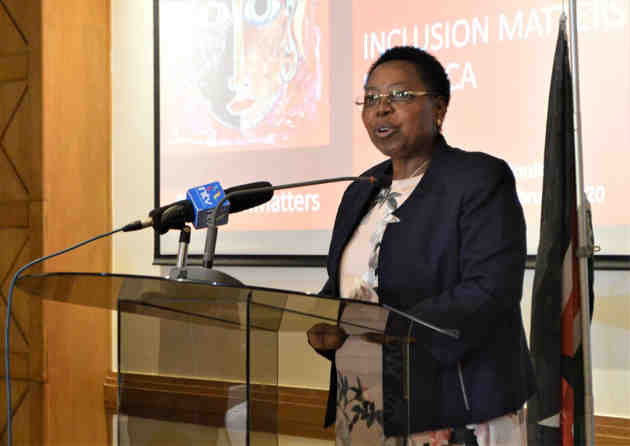STATEMENT ON OBSERVANCE OF THE DAY OF THE AFRICAN CHILD
The National Gender and Equality Commission joins Kenya and the African continent in commemorating the Day of the African Child (DAC) which is marked every year on the 16th day of June. This day is observed in celebration of the African child. It accords African States an occasion to reflect on the opportunities and overcome challenges for full realization of the rights of African children.
The theme for 2023 DAC is “The rights of the child in the digital environment’’. The theme recognizes that the digital environment is becoming increasingly important across most aspects of children’s lives including education, play and leisure, child health services, language mastery, knowledge sharing, and commerce. While digital and virtual development affords new opportunities for the realization of children’s rights, it bears multiple risks on violation and abuse of the African Child. It calls for the urgent need to protect and promote the rights of children in the digital and virtual environment.
Internet access and usage has been increasing globally with estimated 570 million internet users (equivalent to 43% internet penetration) in 2022 in Africa[1]. In Kenya, Digital 2023 report indicates that as of January 2023, there were 17.86 million internet users, 10.55 million social media users, and 63.94 million active cellular mobile connections[2]. Further, a study by UNICEF shows that 67% of children aged 12-17 in Kenya use the internet[3]. The availability of smartphones, computers, tablets and home internet options have increased access to affordable online platforms, services, digital applications and games. Equally, the risk of infringement of child rights on digital environment is fast growing and often without the knowledge of guardians and care givers. There are incidences of online child kidnapping and trafficking, online child grooming, early-age exposure to alcohol advertising, cyberbullying and identity theft, use of children in pornographic activities, online sexual extortion, and exposure of children to adult pornography. Virtual spaces have occasionally compromised child privacy.
The Government of Kenya has made remarkable progress in ensuring the rights of children are protected in the digital environment through policy and legislative measures, and programmatic interventions. Article 53 of the Constitution of Kenya, 2020 guarantees children the right to among others parental care, basic nutrition, shelter and health care, and protection from abuse, neglect, harmful cultural practices, and all forms of violence and inhuman treatment. The Children’s Act, 2022 details mechanisms for protecting child rights and defines child abuse as including among others the exposure of a child to emotionally, traumatic and age-inappropriate content, information and photos of any kind’. Other laws, policies and administrative regulations include the Sexual Offences Act No. 3 of 2006, the Computer Misuse and Cybercrimes Act No. 5 of 2018, the Data Protection Act, No. 24 of 2021; the National Plan of Action Against Sexual Exploitation of Children in Kenya, 2018-2022 and the National Information, Communications and Technology Policy, 2019.
The Commission commends the Communications Authority of Kenya for commencing development of Industry Guidelines for Child Online Protection and Safety in Kenya, and setting up of the National Kenya Computer Incident Response Team – Coordination Centre (National KE-CIRT/CC)- and installation of the KE-CIRT incident reporting mobile application. The Directorate of Criminal Investigation has set up an Internet Watch Foundation (IWF) reporting portal, and established the Anti-Human Trafficking and Child Protection Unit fully equipped with a toll free line. The State has also continuously used the Child Line 116 to monitor progress made in response to child abuses.
Kenya is a signatory to international and regional commitments on child rights including the United Nations Convention on the Rights of the Child (UNCRC) and the African Charter on the Rights and Welfare of the Child (ACRWC).
As we celebrate the Day of the African Child, the Commission appeals to the State to continue expanding the digital space for children, eliminate the digital divide by residence where children in rural areas and those living in the hard-to-reach areas have limited access to internet, increase access to age-appropriate digital tools and knowledge, and support the Ministry of Education to fully integrate technology in delivery of basic education, skill and competency development. For optimal protection of the right of the child in the digital environment, the Commission implores on the State to fully implement all legal and policy frameworks that seeks to protect children from online crimes, abuses and violence, and eliminate digital threats directed to children. This include the full application of cyber-justice. The digital industry has an obligation of expanding online opportunities for children whilst strengthening the child-to-service provider reporting procedures, and referral pathways. They are bound to put in measures to promote responsible digital citizenship among child.
Through the National Parenting Program, the State has the opportunity to equip parents, caregivers and guardians with necessary skills to control exposure of children to only approved age-appropriate online content, detect cases of abuse, and seek for help for appropriate child rehabilitation in cases where children are harmed through online systems. On the other hand, the parent, care givers, teachers, and community at large have the responsibility of empowering the child to among others; detect attempts of online abuse, report cases of violations, and take minimum actions including non-disclosure of identity to protect themselves from further harm. It is, however, the responsibility of the State, Parents and communities to establish a safe online space for children and take all measures requires to protect the children from harmful digital environment.
The Commission assures all Kenyan children, their parents and caregivers, and the digital industries of our commitment to promoting gender equality and protecting the rights of the child in all spheres of life. Let us all work together to ensure that every child is adequately safeguarded to enjoy benefits of the digital environment
SIGNED
Dr. Joyce M. Mutinda, PhD, EBS
Chairperson
[1] Internet usage in Africa - statistics & facts
[2] DataReportal, 2023
[3] UNICEF 2022: Innocenti Research Brief 2022-11.


Comments